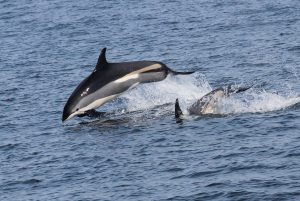
Wouldn’t it be wonderful to go through an entire season without an entangled whale? To visit the beach and never see litter? Our vision is a thriving marine life in the Gulf of Maine with citizens committed to environmental stewardship.
Mission
Our mission is to protect marine life in the Gulf of Maine through research, education and inspiring action.
We achieve that mission through the following major programs:
- Researching the behavior and populations of large whales in the Gulf of Maine and sharing our findings with scientists and resource managers around the Atlantic.
- Teaching people about marine life and human impacts through hands-on experiences. These include beach cleanups, whale watches, school programs and our Blue Ocean Discovery Center in Hampton Beach.
- Inspiring and taking action through marine debris cleanups, pollution prevention campaigns and introducing simple behavior changes anyone can take to benefit Gulf of Maine marine life.
Recent Accomplishments
- Each year, we conduct education and research aboard whale watch trips in Rye, NH. During these trips, we educate thousands of passengers and document hundreds of individual whales. This work allows us to monitor population health, habitat usage, and risks including entanglement and ship strikes. This year, we’ve been working on transitioning our data collection to a state-of-the-art, electronic system.
- Our long-term database of the whales near Jeffreys Ledge is the only one of its kind. It allows us to learn about this unique habitat- a place important for whales and other marine life to feed, along with several human uses such as whale watching, fishing and boating.
- As the only New Hampshire-based marine mammal internship program, we have hosted more than 155 student interns since 2002 and provided a crucial step in these students’ career paths.
Some of our 2023 accomplishments:
- In 2023, we continued our long-term whale research. Using a unique software program called Mysticetus, we collected data on 155 trips this year. This included 5 whale scouting trips. During these dedicated all-day trips, we spotted 22 whales that weren’t seen on our regular whale watches. Through the season, we identified 90 individual humpback whales. Mysticetus allows us to collect data quickly and process it more easily. Thus, we can share our sightings with other researchers around the Gulf of Maine and inform management actions to protect these magnificent animals.
- We taught 10,455 whale watch passengers about the ocean and how to protect it. We also hosted five amazing student interns to assist with research and education.
- We worked with volunteers to conduct more than 300 beach cleanups and removed more than 150,000 pieces of litter from local beaches!
- A new app allows boaters and fishermen to report whale sightings, giving us more data on whales and their habits. We look forward to expanding this program in 2024 and helping boaters form deeper connections with the individual whales we all love.
- We secured one of our largest marine debris grants to date and look forward to using the funds to clean up derelict fishing gear in the region over the coming 3 years. We also continued our successful partnership with Howell Conservation Fund to study microplastics and started working with Shaw Institute to find the source of these tiny pollutants.
- We hosted over 10,000 visitors at our Blue Ocean Discovery Center, and our inflatable whale visited hundreds of students. We are working on an exciting redesign of our educational programs for 2024!
- We’ve closely followed news and actions related to climate change and developments such as offshore wind and commented on actions when appropriate. Our data helps us document important whale habitats and will assist in monitoring whale populations as new developments occur.
